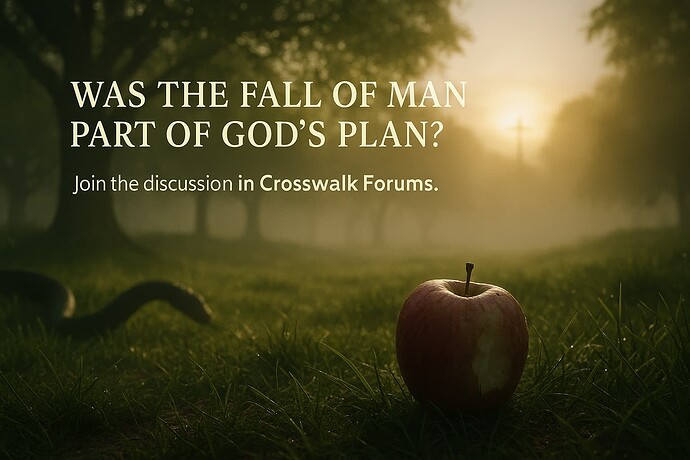Samuel_23, I see you’ve unpacked the whole theological toolbox—Greek terms, Latin quotes, Rabbinic musings, and a shout-out to Schleiermacher for good measure. Impressive. But now let’s stop polishing the lenses and look squarely through them. Here’s the heart of it:
Was the Fall part of God’s eternal decree—or a tragic accident He scrambled to redeem?
Let’s clear the sanctified fog.
God’s Sovereignty Ain’t on a Leash
First, this idea that the Fall took God by surprise? That He was sitting in heaven wringing His hands after Adam bit the fruit? Nah. Psalm 115:3 says, “Our God is in the heavens; He does all that He pleases.” Not most. Not some. All.
So when Ephesians 1:11 says God “works all things according to the counsel of His will,” that includes Eden. You don’t get to exclude the most pivotal event in human history from “all things” without rewriting Scripture to suit your philosophical palate.
God Didn’t Cause Sin—But He Ordained a World Where It Would Happen
And here’s where your concern about divine culpability shows up with a furrowed brow. But let’s not confuse “ordain” with “author.” God is not the author of sin (James 1:13). But He ordained a reality where sin would occur to magnify His mercy, wrath, justice, and grace—Romans 9:22–23 style. He doesn’t need a PR team. He’s not hiding in the back, hoping no one reads the Old Testament.
The Cross wasn’t Plan B. Revelation 13:8 calls Jesus “the Lamb slain from the foundation of the world.” That means the Fall was not a theological whoopsie—it was the black canvas for the brightest light of redemption.
The Felix Culpa: Not Just Pretty Latin
Felix culpa isn’t sentimental poetry. It’s the blazing truth that without the Fall, we wouldn’t know the depth of divine grace. Romans 5:8 says, “While we were yet sinners, Christ died for us.” That “while” exists because of the Fall. No Fall, no incarnation. No incarnation, no atonement. No atonement, no resurrection. No resurrection… no hope. The cross wasn’t God fixing a problem—it was God revealing His plan.
Molinism? Cute. But Scripture Doesn’t Need a Middleman
I see the appeal of Molinism—it tries to sneak libertarian free will into the back door of divine sovereignty like it’s smuggling snacks into the theater. But Scripture doesn’t balance man’s freedom and God’s will—it crushes the pride of man under the throne of God. Job 42:2: “I know that You can do all things, and that no purpose of Yours can be thwarted.” That includes Adam’s misstep, Cain’s murder, and your Tuesday.
The Real Theodicy: God’s Glory Trumps Our Philosophical Comfort
You wanna talk theodicy? Okay—God permits evil to showcase His glory. Not because He’s callous, but because He’s holy. Isaiah 46:10: “I declare the end from the beginning… saying, ‘My counsel shall stand, and I will accomplish all my purpose.’” That means even the Fall serves the purpose of glorifying Christ.
So the real offense here isn’t that God included the Fall in His plan. It’s that He didn’t ask our permission to do it.
Here’s the bottom line:
If the Fall wasn’t part of God’s eternal decree, then the cross was a divine reaction, not a sovereign intention.
And if that’s your theology, you haven’t just undermined Calvin—you’ve neutered the gospel.
—Sincere Seeker. Scripturally savage. Here for the Truth.
